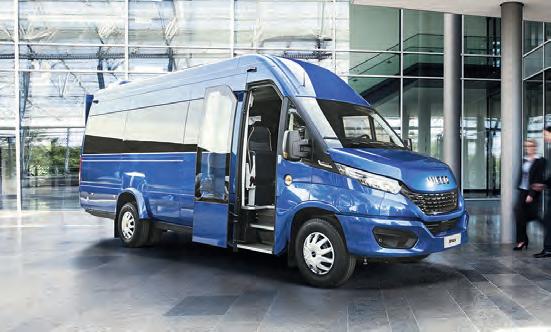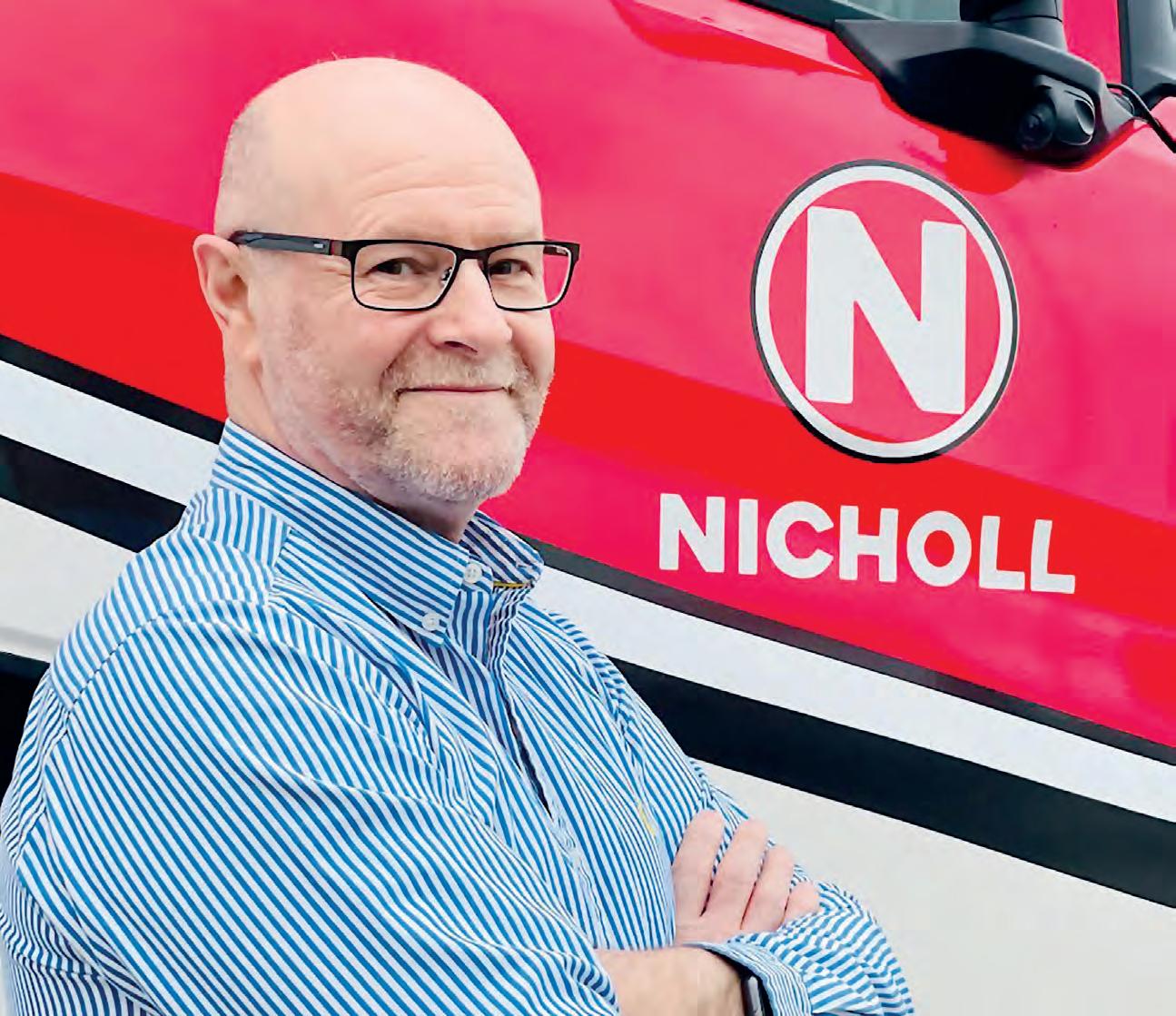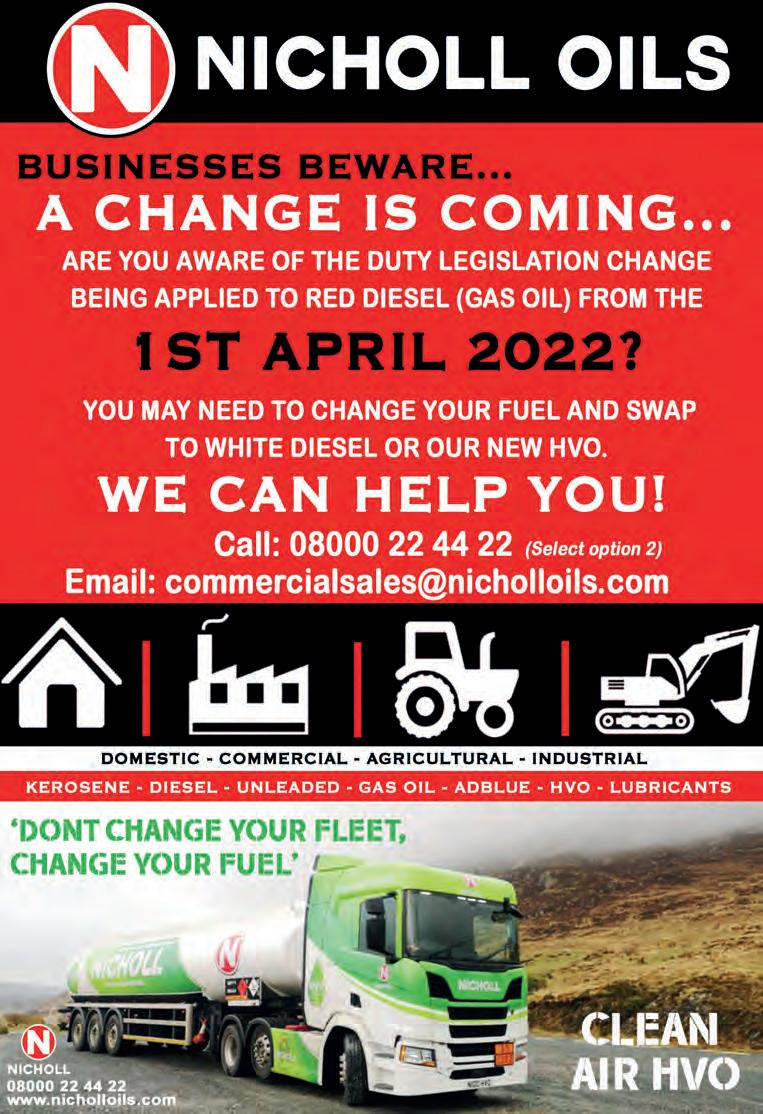
10 minute read
Iveco’s annual State of the Nation
from Export & Freight Feb-Mar 22
by 4SMNI

IVECO DELIVERS HEALTHY ‘STATE OF THE NATION’ REPORT
Iveco’s 33rd ‘State of the Nation’ press conference - the first for several years – was recently held at its UK headquarters in Basildon. Export & Freight’s Phil Eaglestone was there.
Special guest for the day was Mike Hawes, Chief Executive Officer of the SMMT, who was joined by a number of Iveco directors who delivered upbeat reports on the past year’s activities and confident predictions for the year ahead. Describing 2021 as a pivotal year for Iveco in the UK , Truck Business Line Director, Gareth Lumsdaine, told the gathering journalists: “Our market is up. Our volumes are up. Our product range is the strongest it’s ever been, and with the ambitions of 2035 and 2040 moving even closer, we’re strengthening our position as a leader in alternative fuels.” He added: “Of course, the last two years have meant tough times for all, for businesses - with the challenges of Brexit, change, COVID - and now with spiralling energy costs, and for those of us in truck manufacturing, semi-conductor and supply chain shortages constraining our ability to deliver. “In that sense, we’ve been hit like all our competitive manufacturer colleagues, but apart from a 2-week layoff when production ceased through a lack of components, we think we were in a better position than most. We kept our order book open and we’ve continued to build, albeit maybe not as fast as we would have liked.” He said driver shortages, changes to the way we retail and shop, the need to respond to climate change and decarbonisation, the demands of clean air and low emission zones, and the challenges of meeting London’s new Direct Vision Standard all combined to have a huge impact on the demand for trucks in 2021. So how did Iveco do in all this? “2021 was the strongest year we’ve had here in the UK for over a decade. That comes from doing the right thing. However gratifying the trends are, the important thing is - they tell a story about our dealers - their stoicism, their strength and their determination to support our customer base, about our people - working from home, working long hours, going the extra mile and focusing on getting it right ...and about our products.” So what about 2022? “Things are improving - and we do believe that as we move further into the year, things will continue to ease gradually, but right now, market registrations reflect supply, far more than demand. We’re expecting tractor registrations to pick up faster as supply improves and demand drags itself out of two tough years. We’re expecting rigids - eight wheelers in particular - to be a bit slower as the effects of last year’s shortages and lack of body slots at bodybuilders continue to prolong lead times.”
VAN MARKET
Meanwhile, there was an equally upbeat report from Iveco’s Light Business Line Director, Mike Cutts, saying that from 3.5 to 6 tonnes, volumes increased more than any other brand on the market. “As a manufacturer focused more on the needs of professionals, our Daily product was wellsuited to capitalise on the strongest growth areas - dot com, construction and the utilities. Indeed, some 70% of our 3.5 tonne volumes were chassis-cab, bodied vehicles as opposed to simple white vans. Not only that, we took the strategic decision to re-enter the dot com channel in particular, with a 5-year strategy. As an example, we delivered 645 three and a half tonne Dailys to Tesco last year whilst other manufacturers struggled to supply.” He added: “After a strong performance in 2021, and with a healthy order book right now, we’re continuing to be bullish. We have our exciting new Model Year 22 Daily. Launched some 6 months ago, and now arriving on the UK roads, New Daily takes innovation and connectivity to new heights with best-inclass comfort and safety, even greater levels of mission focus, and reductions in TCO. “It has a new 6-speed manual gearbox. Precision gear engagement and the very best in gearshift feel and comfort will make it a favourite for drivers, especially in urban around-town applications. It adopts new state-of-the-art engine technology, giving full compliance to ‘Light Duty Step D Final’ and ‘Heavy Duty Step E’ requirements ahead of new regulations. Daily’s 2.3 litre F1A now delivers up to 6% fuel savings over the previous model, whilst its new 6-speed manual gearbox enables a torque increase of up to 15%, and later this year, we’ll be launching our electric Daily.”
ALTERNATIVE FUELS
On the future for alternative fuels, Jorge Assensio, Medium and Heavy Product Manager and Alternative Fuels Business, said the greatest challenge is to deliver a new, greener, cleaner world, which has huge implications for those in road transport. “Fossil fuels like diesel aren’t good for our environment. It’s an inescapable fact, and despite our success in reducing the harmful emissions these fuels produce, we cannot get away from the reality that - even under the exacting provisions of today’s Euro VI - burning one litre of diesel produces 2.63 kgs of CO2. That was the case in 1930. And it remains the case in 2022. “If we are to deliver the new, greener, cleaner world we all want then that has to change. Yes, it can be done, but there is no obvious route to achieving that. “At the moment, there is still much discussion on the right and wrong ways of doing so, and for sure, there will be no ‘one answer fits all’ solution for several decades to come,” he said. “But the good news is that we as van and truck manufacturers, along with all our competitive colleagues, have entered that marathon. We’ve got the gear, we’ve done the training, and already we’re up and running. “Biomethane is a gateway to the future - and Iveco will continue to develop it as a mainstream alternative to diesel, but it is an interim solution. We expect its popularity to peak around 2030 when emissions-free solutions become a real world, practical alternative. The next part of the journey will be battery electric, followed by hydrogen - in particular, hydrogen fuel cell. That is what we are working on now, in partnership with those who will supply the all-important support infrastructure that’s going to be needed to make it work.”
ROD HAWKINS APPOINTED BUSINESS DEVELOPMENT MANAGER AT NICHOLL OILS

Rod Hawkins has clearly hit the ground running, returning after 17 years to Nicholl Oils as its new Business Development Manager for Northern Ireland, having spent several years at NI Trucks.
There, he had the dual role of Heavy Truck Business Development Manager, representing both NI Trucks in Northern Ireland and their sister company, Emerald Truck & Van, the Iveco distributor for Ireland. The Carrickfergus man, who prior to his NI Trucks appointment worked at Scania dealers Road Trucks where he spent six years, has been in the industry since 1984 and that wealth of experience is already being put to good use in his new role which he took up at the beginning of the year. The timing of his appointment couldn’t have been any more appropriate, with two major issues facing the transport, quarry and construction sectors: the imminent removal of rebates for red diesel and the emergence of a more environmentally friendly fuel alternative HVO. Nicholl Oils are well placed to help customers meet those issues; with its Head Office located in Greysteel and depots in; Belfast, Omagh, Coleraine, Dromore, Strabane, Newtownards, Ballymena, Mallusk, Cookstown, Dungannon and Enniskillen, all strategically positioned to ensure a provincewide delivery service. The company has grown over the 60 years to become Northern Ireland's largest independent oil distributor. While promoting Nicholl Oils core products - Derv, Gas Oil, Petrol and Kerosene - to the haulage, quarry and fuel reseller markets, Rod will also be focused on introducing customers to HVO, hailed as a perfect replacement for diesel. From April this year, red diesel will no longer be available at a rebated rate for many commercial applications, and most current users of red diesel will have to switch to white diesel which will attract the full rate of tax. Industry users of heavy plant, machinery and equipment such as excavators, dumpers, loading shovels and screening plants will no longer be able to

BENEFITS OF CLEAN AIR HVO RENEWABLE DIESEL AT A GLANCE
Up to 90% reduction in net CO2 greenhouse emissions meaning the fuel is significantly better for the environment than a regular diesel or biodiesel. Great cold weather vehicle performance due to the higher cetane number which is up to 90 and a low cloud point gives a better starting performance, less chance of any waxing in extreme temperatures and a clean combustion. Manufactured from waste fats and vegetable oils makes Clean Air HVO renewable and sustainable. High flashpoint meaning it is safer for storage and handling compared to regular diesel. As a replacement for regular diesel and gas oil a wide variety of OEM approvals means the fuel can be used without requiring any vehicle modifications meeting EN15940 standards required for paraffinic fuels. (On their websites, Scania, Volvo, Iveco, DAF, MAN, John Deere and Caterpillar all approve the use of HVO) Clean Air HVO Renewable Diesel/Gas Oil will also result in improved air quality as it reduces any notifiable particulate matter and nitrogen oxide emissions.
run them on red diesel and the permission to use red diesel for commercial heating and power generation will also be affected. Not surprisingly, some of our leading contractors in the construction industry are already switching to HVO and comments Rod: “We are expecting a surge of new customers in the months ahead, so we are fully stocked to meet that demand.” He added: “For customers wanting to put HVO to the test, we can supply a bunded tank on their premises, enabling them to trial this alternative fuel in their vehicle, plant and machinery fleets.” So, what exactly is HVO? For those not familiar with this increasingly popular fuel alternative, the clue is in its description. HVO stands for ‘hydrotreated vegetable oil,’ which is manufactured from sustainable raw materials that do not impact adversely on the environment; indeed as a clean air renewable fuel, HVO can reduce up to 90% of your net CO2 emissions. It can also help to tackle another pressing issue, says Rod. “The continuing issue surrounding semiconductor chips has meant that truck manufacturers’ lead times are stretching into 2023, so those HGV operators looking for alternative fuel powered vehicles such as CNG or electric to reduce their carbon footprint will have to wait much longer to put their carbon reduction plans into action. “On the other hand, by switching to HVO your trucks can be up and running within a week – and without any changes to the vehicle’s filters or engines. Essentially, you can just drain your diesel tank, fill up with HVO and off you go, no matter the size of your truck’s power unit.” HVO can be ordered in bulk from Nicholl Oils and will become available as demand increases at its network of Nicholl Auto 365 Forecourts.
FUEL CARDS
The company’s Local Account fuel card can be used across that network; it is ideal for businesses with a mobile workforce. The cards are safer than cash, both for companies and individual drivers, and more efficient than credit cards. They can also provide businesses with valuable savings through detailed reporting on fuel spend and usage. Businesses can then use this information to identify areas of inefficiency within the fleet. Meanwhile, for those businesses operating throughout the UK, the company’s Fleet Diesel card is a more appropriate alternative. It can be used at 285 sites in Northern Ireland and a further 1,100 sites throughout the rest of the UK.
For further information, Rod Hawkins can be contacted on 07760616329 or email: rod.hawkins@nicholloils.com










